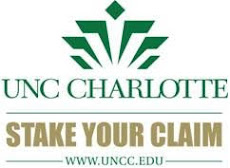On September 21, UNC
Charlotte students conduced peaceful demonstration in response to a police shooting in Charlotte’s University City area.
 |
| Chancellor Dubois addressed a gathering of concerned students on Sept. 21. |
The
demonstration follows the death of 43 year old Keith Lamont Scott who was shot
and killed Tuesday afternoon by a Charlotte-Mecklenburg police officer.
Members of
Black Student Union (BSU), a student organization at UNC Charlotte invited the
campus community to join them in raising awareness concerning police shootings.
Wednesday,
Sept 21, participants gathered in front of the Popp-Martin Student Union for a
community forum to share personal accounts and fears surrounding racial
injustice.
Following
a moment of silence to honor the victims of police brutality, Chancellor Philip
Dubois expressed his condolences and encouraged students to both speak out and
exercise their right to vote.
Shortly
after, a group of nearly 150 students met on the back patio of the student
union to protest.
 |
| Students assemble prior to a demonstration in the Popp-Martin Student Union rotunda. |
Led by Fahn
Darkor, Student Government Association
President, participants prayed and were reminded of the importance of their involvement. Darkor asked demonstrators to avoid using their phones to document their participation and to instead remain present in the moment.
Entering the union, protesters laid down, lining the
floor of the student union rotunda. Their bodies sprawled side by side was a
visual reminder of the slain victims of police brutality.
As visitors entered the union, protesters sang songs of
encouragement and openly shared why they chose to participate.
 |
| Students lie down in an expression of solidarity. |
“I do this because my oppression is not a figment of my
imagination,” one student said.
“I do this for Tamir
Rice, Michael Brown, Trayvon Martin and Korryn Gaines.”
“I do this so they’ll listen,” another said.
As a campus community that serves as an anchor for all of
University City, UNC Charlotte as a whole grieves the loss of human life. The
safety and well-being of all members of the campus community remains a priority
for the University.
# # #
Leanna Pough ('15) is communications coordinator in the Office of Public Relations.

